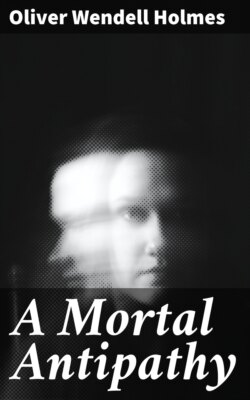A Mortal Antipathy

Реклама. ООО «ЛитРес», ИНН: 7719571260.
Оглавление
Oliver Wendell Holmes. A Mortal Antipathy
A Mortal Antipathy
Table of Contents
PREFACE
A MORTAL ANTIPATHY
FIRST OPENING OF THE NEW PORTFOLIO
INTRODUCTION
“And why the New Portfolio, I would ask?”
THE NEW PORTFOLIO: FIRST OPENING
A MORTAL ANTIPATHY
I. GETTING READY
II. THE BOAT-RACE
III. THE WHITE CANOE
IV. THE YOUNG SOLITARY
V. THE ENIGMA STUDIED
VI. STILL AT FAULT
VII. A RECORD OF ANTIPATHIES
VIII. THE PANSOPHIAN SOCIETY
IX. THE SOCIETY AND ITS NEW SECRETARY
X. A NEW ARRIVAL
XI. THE INTERVIEWER ATTACKS THE SPHINX
XII. MISS VINCENT AS A MEDICAL STUDENT
XIII. DR. BUTTS READS A PAPER
XIV. MISS VINCENT'S STARTLING DISCOVERY
XV. DR. BUTTS CALLS ON EUTHYMIA
XVI. MISS VINCENT WRITES A LETTER
XVII. Dr. BUTTS'S PATIENT
XVIII. MAURICE KIRKWOOD'S STORY OF HIS LIFE
XIX. THE REPORT OF THE BIOLOGICAL COMMITTEE
XX. DR. BUTTS REFLECTS
XXI. AN INTIMATE CONVERSATION
XXII. EUTHYMIA
XXIII. THE MEETING OF MAURICE AND EUTHYMIA
XXIV. THE INEVITABLE
POSTSCRIPT: AFTER-GLIMPSES
Отрывок из книги
Oliver Wendell Holmes
Published by Good Press, 2019
.....
Here are some of my metempsychoses: Ten years ago I wrote what I called A Memorial Outline of a remarkable student of nature. He was a born observer, and such are far from common. He was also a man of great enthusiasm and unwearying industry. His quick eye detected what others passed by without notice: the Indian relic, where another would see only pebbles and fragments; the rare mollusk, or reptile, which his companion would poke with his cane, never suspecting that there was a prize at the end of it. Getting his single facts together with marvellous sagacity and long-breathed patience, he arranged them, classified them, described them, studied them in their relations, and before those around him were aware of it the collector was an accomplished naturalist. When—he died his collections remained, and they still remain, as his record in the hieratic language of science. In writing this memoir the spirit of his quiet pursuits, the even temper they bred in him, gained possession of my own mind, so that I seemed to look at nature through his gold-bowed spectacles, and to move about his beautifully ordered museum as if I had myself prepared and arranged its specimens. I felt wise with his wisdom, fair-minded with his calm impartiality; it seemed as if for the time his placid, observant, inquiring, keen-sighted nature “slid into my soul,” and if I had looked at myself in the glass I should almost have expected to see the image of the Hersey professor whose life and character I was sketching.
A few years hater I lived over the life of another friend in writing a Memoir of which he was the subject. I saw him, the beautiful, bright-eyed boy, with dark, waving hair; the youthful scholar, first at Harvard, then at Gottingen and Berlin, the friend and companion of Bismarck; the young author, making a dash for renown as a novelist, and showing the elements which made his failures the promise of success in a larger field of literary labor; the delving historian, burying his fresh young manhood in the dusty alcoves of silent libraries, to come forth in the face of Europe and America as one of the leading historians of the time; the diplomatist, accomplished, of captivating presence and manners, an ardent American, and in the time of trial an impassioned and eloquent advocate of the cause of freedom; reaching at last the summit of his ambition as minister at the Court of Saint James. All this I seemed to share with him as I tracked his career from his birthplace in Dorchester, and the house in Walnut Street where he passed his boyhood, to the palaces of Vienna and London. And then the cruel blow which struck him from the place he adorned; the great sorrow that darkened his later years; the invasion of illness, a threat that warned of danger, and after a period of invalidism, during a part of which I shared his most intimate daily life, the sudden, hardly unwelcome, final summons. Did not my own consciousness migrate, or seem, at least, to transfer itself into this brilliant life history, as I traced its glowing record? I, too, seemed to feel the delight of carrying with me, as if they were my own, the charms of a presence which made its own welcome everywhere. I shared his heroic toils, I partook of his literary and social triumphs, I was honored by the marks of distinction which gathered about him, I was wronged by the indignity from which he suffered, mourned with him in his sorrow, and thus, after I had been living for months with his memory, I felt as if I should carry a part of his being with me so long as my self-consciousness might remain imprisoned in the ponderable elements.
.....